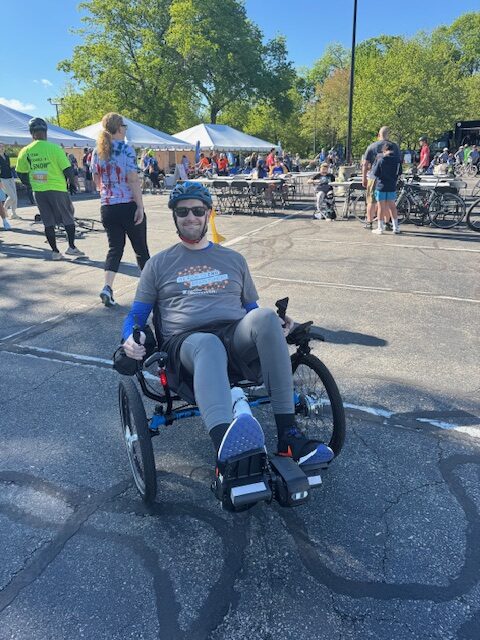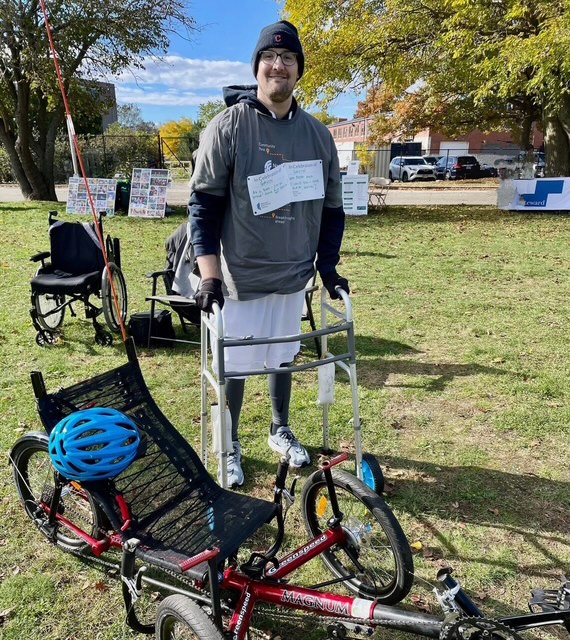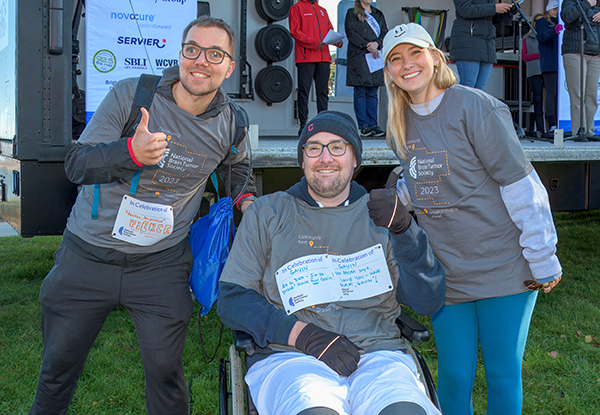In 2019, I was 25 years old, working as a technical writer, living with a roommate, and driving a new car I had just bought. My life was typical for someone my age — until it wasn’t.
That fall, I started experiencing symptoms I couldn’t explain. My balance was off. I was vomiting randomly at work. I fell while walking my friend’s dogs. I dismissed it at first, chalking it up to getting older or maybe being tired. But deep down, I knew something was wrong.
By the time I made it to my family doctor, I was feeling seriously unwell. Things moved fast from there. A CT scan, an ambulance ride to the ICU at the Cleveland Clinic, and a 17-hour surgery to remove a tumor growing on my medulla, located behind the cerebellum.
The tumor was a medulloblastoma — a rare brain tumor in adults, occurring in fewer than one in a million cases.
Trying to Communicate After Surgery
When I woke up from surgery, I couldn’t breathe on my own. I couldn’t speak. I spent 72 nights in the hospital. During that time, I developed a deep vein thrombosis, a pulmonary embolism, and pneumonia. I was nonverbal for six weeks.
During that time, I understood everything going on around me, but I couldn’t express myself. I didn’t want my family and friends to leave the hospital room because I couldn’t advocate for myself, but I had no way to say it. I remember desperately trying to put the Blink-182 song “Don’t Leave Me” on my phone as a way to communicate what I couldn’t say out loud. It was one of the only tools I had.
My sister made emoji-style cards to help me communicate. I was too weak to hold them up, so I’d squeeze her hand for “yes” and blink tightly for “no.” That was our system.
I went on to receive 30 consecutive days of radiation and six months of chemotherapy. By the end of treatment, I was declared cancer-free.
Getting Diagnosed With Posterior Fossa Syndrome
I’m lucky my tumor was operable, but the cost of successfully treating the tumor was severe physical disability.
I was eventually diagnosed with posterior fossa syndrome (PFS), which is a rare complication that affected my speech and movement. I have small cognitive challenges, like occasionally struggling to find the right word.
I understand everything people say to me, but I know they sometimes assume otherwise based on how I speak. It’s one of the most frustrating parts of recovery. I’ve had to develop strategies to help people understand me. I speak slower, I repeat myself if needed, and I try to lead with confidence because I know what I have to say matters.
Recovering my voice has taken years, but I’ve come a long way, and I’m proud of that.
The effects of PFS have been lasting and life-altering. I use a wheelchair. I have dysarthric speech and double vision. I’ve lost a great deal of independence — driving, managing personal hygiene with ease, and other everyday things I used to take for granted.
I’ve always been involved in some kind of rehabilitative therapy, and I’ve made significant progress. Coming from a place where nearly anything physical was a challenge, it’s amazing to think about where I am today.
Finding Community
I’ve found a lot of healing through community. I’m an extrovert by nature, and after my diagnosis, I was desperate to connect with others who understood what I was going through. I attended the New England Brain Tumor Walk for the first time two years ago and returned the following year. At the event, I met people from my young adult group at Massachusetts General Hospital in person for the first time. That meant a lot.
I’ve also been lucky to have a supportive care team, including my oncologist, PCP, physiatrist, endocrinologist, and neuro-ophthalmologist, who all play a role in helping me move forward. My MRI scans have been stable and are now six months apart.
And my family has been everything. My parents have driven me to events and appointments. My sister made a paper chain with handwritten notes from her coworkers on each link to keep me encouraged during recovery. It may seem small, but reading those messages every day meant the world to me.
I’ve also learned to take joy in small things. I love biking and walking by the ocean near my home in Boston. I still game. I try to stay active and surround myself with people who make me feel like myself.
My Tips to Others
If you’re newly diagnosed with a brain tumor or facing PFS, here’s what I want you to know: Trust your medical team. It can be easy to spiral into fear or self-doubt, but your doctors are knowledgeable, experienced, and want what’s best for you. And don’t isolate yourself. Find people to talk to. Seek out community. Do things that make you feel like you again.
So many parts of my life have changed, but my determination to live fully and embrace social opportunities hasn’t.





